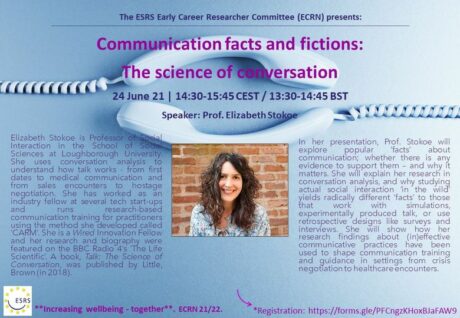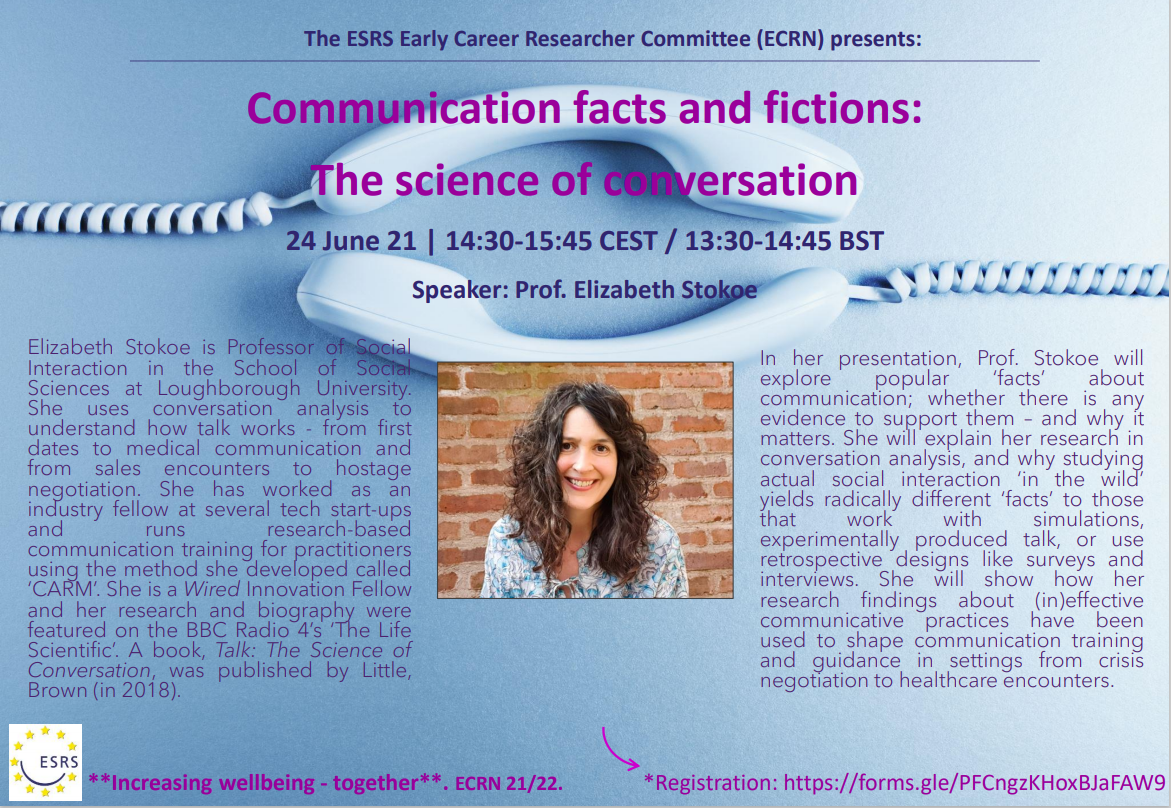Sleep Science Friday: The Early Career Researchers Network
18 June 2021
‘The COVID pandemic has affected the plans, career perspectives and also wellbeing of those early career sleep researchers and clinicians, we therefore want to make sure the ECRN really becomes a support network for anyone at an early career stage and interested in sleep. This year, we’ve chosen ‘Increasing Wellbeing-Together’ as our motto: Together we can help each other in feeling good and achieving what we aim for in our careers.” states Annemarie Luik, Assistant Professor at the Department of Epidemiology of the Erasmus MC University Medical Center in Rotterdam, the Netherlands. Annemarie is the current Chair of the ESRS Early Career Researchers Network (ECRN) and a member of the ESRS Board.
With this statement in mind, the ECRN has adapted to the global situation and created a speaker series focused on increasing wellbeing together to meet the needs of early career researchers navigating this unexpected uncertainty in life and in their careers.
The first webinar, Mental Health in Academia, was held in February and featured, Dr. Marissa Edwards from the University of Queensland whose research focuses on mental health and mental illness in higher education. The second webinar, Work-Life Balance – Is that a realistic idea?, took place last month and featured Prof. Anja Strobel, Professor of personality psychology and psychological assessment at Chemnitz University of Technology.
The next webinar in this series is coming up on 24 June from 14:30 – 15:45 CEST and all are invited to attend. This third webinar is titled, Communication facts and fictions: The science of conversation. Prof. Elizabeth Stokoe, School of Social Sciences, Loughborough University will speak about communication ”facts” and explore if there is evidence to support them based on her work studying social interactions. She plans to provide a comparison of various study methodologies and the results they yield. She will also explore the implications of her research findings in real world situations. Register now to participate. https://forms.gle/PFCngzKHoxBJaFAW9

Annemarie also stresses “The ECRN is mostly known for the Early Career Events at the ESRS, we certainly love our ECRN networking event! But we want to do so much more and be more visible throughout the year, that’s why we have just launched a survey to get to know the early career researchers and clinicians in the field better. This will allow us to tailor our activities to what is most needed and develop the ECRN further. If you have a spare couple of minutes, please do complete it or reach out to us!”
The ECRN is an active network which aims to support its members, you are encouraged to reach out via email ecrn_ec@esrs.eu and the facebook page. Currently, the ECRN is surveying early career researchers and clinicians to find out more about how to meet the needs of the group and would appreciate your feedback in this brief survey.
Recent publications from ESRS members:
- Steine IM, Skogen JC, Hysing M, Puigvert L, Schønning V, Sivertsen B. Sexual harassment and assault predict sleep disturbances and is partly mediated by nightmares: Findings from a national survey of all university students in Norway. J Sleep Res. 2021 Jun 15:e13338.
- Rönnlund H, Elovainio M, Virtanen I, Heikkilä AR, Raaska H, Lapinleimu H. Poor parental sleep did not predict future sleep problems in children aged 2 to 6 years. Acta Paediatr. 2021 Jun 15.
- Dimanico MM, Klaassen AL, Wang J, Kaeser M, Harvey M, Rasch B, Rainer G. Aspects of tree shrew consolidated sleep structure resemble human sleep. Commun Biol. 2021 Jun 11;4(1):722.
- Beck J, Loretz E, Rasch B. Exposure to relaxing words during sleep promotes slow-wave sleep and subjective sleep quality. Sleep. 2021 Jun 11:zsab148. doi:10.1093/sleep/zsab148.
- Ferri R, Mogavero MP, Bruni O, Plazzi G, Schenck CH, DelRosso LM. Increased Chin Muscle Tone during All Sleep Stages in Children Taking SSRI Antidepressants and in Children with Narcolepsy Type 1. Sleep. 2021 Jun 10:zsab147.
- Sforza M, Galbiati A, Zucconi M, Casoni F, Hensley M, Ferini-Strambi L, Castronovo V. Depressive and stress symptoms in insomnia patients predict group cognitive-behavioral therapy for insomnia long-term effectiveness: A data-driven analysis. J Affect Disord. 2021 Jun 15;289:117-124.
- Castro-Grattoni AL, Suarez-Giron M, Benitez I, Tecchia L, Torres M, Almendros I, Farre R, Targa A, Montserrat JM, Dalmases M, Barbé F, Gozal D, Sánchez-de-la-Torre M. The effect of chronic intermittent hypoxia in cardiovascular gene expression is modulated by age in a mice model of sleep apnea. Sleep. 2021 Jun11;44(6):zsaa293.
- Kalleinen N, Aittokallio J, Lampio L, Kaisti M, Polo-Kantola P, Polo O, Heinonen OJ, Saaresranta T. Sleep during menopausal transition: a 10-year follow-up. Sleep. 2021 Jun 11;44(6):zsaa283.
Just published an article? Want your research to be featured? Saw something interesting? Contact us at ESRS…
ESRS Reminders
RNC Call for New Effective Members
Are you interested in stepping up your contribution to the work of ESRS? The Research Network Committee (RNC) has just launched its Call for New Effective Members.
They’re seeking a Project Manager to investigate the possibilities and eventually set up an ESRS Foundation, in line with their mission to promote collaborations and information exchange between different fields within sleep research.
Applications will be accepted until 30-June. Here’s more information on the project and how to apply.



